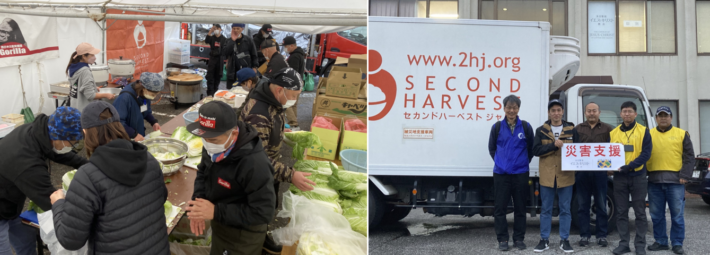2024.5.23
[Press Release] Second Harvest Japan to Launch Full-scale Operation of Nakanoto Base, Providing Mid-term Support to Disaster-stricken Areas in Ishikawa.
Second Harvest Japan to Launch Full-scale Operation of Nakanoto Base, Providing Mid-term Support to Disaster-stricken Areas in Ishikawa.
Second Harvest Japan (2HJ), Japan’s first food bank headquartered in Taito-ku, Tokyo, has commenced full-scale operations at its Nakanoto base in Nakanoto-cho, Kashima, Ishikawa Prefecture, to provide mid-term support to areas affected by the Noto Peninsula earthquake. 2HJ has consistently collaborated with disaster relief and local organizations to launch this base, and to continue working together in existing emergency assistance.

The 2HJ Nakanoto base serves as a hub to support disaster-stricken areas. It has easy access to affected regions and highways and is conveniently located for transporting food from 2HJ’s Kanto region bases and company partners. The warehouse, with an area of 444.78㎡, has plenty of space for food storage, and there is a parking space in front for loading and unloading food. Twelve organizations that provide food assistance participated in three information sessions starting on April 23. Participants were introduced to 2HJ’s activities, the registration procedure, the usage rules for receiving food from 2HJ and a tour of the warehouse. In addition to food transported from the 2HJ Saitama base, OREO cookies were shipped directly from Mondelēz Japan Limited on May 8. We plan to establish a proper operation cycle for food transportation and delivery within the next month.
After the period of emergency assistance, some people might still be forced to live in temporary housing. Even if they are able to return to their homes, rebuilding their daily lives, including repairing destroyed houses, will be costly. Consequently, it is expected that some people will continue to face disaster-related hardship in the future.
”Even now, four months after the earthquake, many people in the affected areas still need food assistance,” said Hitomi Yokote, CEO of 2HJ. “To provide continuing support, 2HJ will strengthen cooperation with the government and other organizations. Additionally, there is a shortage of food in these areas, so we would be grateful for food donations and financial support from our company supporters. ”
2HJ will continue to work with stakeholders to expand the functions of the Nakanoto base and enhance the collaborative network with each partner organization. This will help provide nutritious and sufficient food to people in need, including those who are evacuees in their homes.
2HJ’s Support Activities in Areas Affected by the Noto Peninsula Earthquake
2HJ arrived at the site on January 6, immediately after the disaster occurred, and held a soup kitchen for victims at a community center in Nanao City, Ishikawa Prefecture, together with the disaster relief team Gorilla and other local organizations. During the first 10-day soup kitchen, a total of 12,620 meals were served to 3,550 people. The second and third soup kitchens were also held in collaboration with Gorilla and local organizations.
Additionally, 2HJ visited Wajima City, where the Higashi Honganji temple Soup Kitchen Group, Association for Aid and Relief Japan, and Nippon International Cooperation for Community Development provided food assistance. 2HJ also visited Suzu City, where Peace Boat Disaster Relief conducted their soup kitchen to bring food that meets the needs of each area based on surveys conducted in advance.

2HJ´s Disaster Prevention and Mitigation Project
2HJ has been implementing a three-year plan starting in 2022 to build a wide-area food support project for emergency situations together with its affiliated food banks, using dormant deposits. The goals include creating an ‘Assessment Sheet’ to determine necessary support details, a ‘Timeline’ to summarize actions for smoother support immediately after a disaster occurs, and a ‘Guideline’ to plan each support activity.
Starting in 2023, 2HJ has been holding study sessions in the Chugoku and Kyushu regions to develop a food support timeline tailored to the needs of each region and to foster networking.

